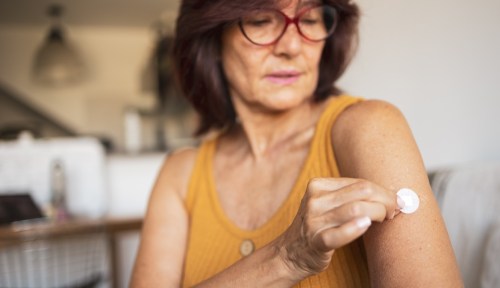Our editors independently select these products. Making a purchase through our links may earn Well+Good a commission
Hot flashes. Night sweats. Mood swings. If the entirety of your menopause knowledge can be summed up by those six little words (or even fewer), you’re not alone. Many women—even those going through menopause themselves—are clueless about the changes happening to their bodies during middle age.
In fact, when researchers asked 500 menopausal women to explain the difference between perimenopause, menopause, and post-menopause, more than half couldn’t. Clearly, there’s a knowledge gap when it comes to this, er, period of our lives.
And according to Pat Wingert, co-author of The Menopause Book, that gap extends to the medical community, too. “One of the things that’s important to understand is that women have not gotten as much good quality medical research as men,” she says. “For many, many years, men were the gold standard of studies, so we’re really behind in understanding women’s health.”
Add on many women’s hesitancy to talk about their periods with friends or family members—especially those who grew up before the menstrual realness movement took off—and it’s clear why many women are caught off guard when menopause hits. To help clear up some of the myths and misconceptions, I asked a few doctors to speak openly about the biggest surprises many women experience when it comes to this stage of life. After all, it’s good to be prepared. (Especially because menopause may be coming sooner than you think.)
Keep reading for 5 things no one tells you about menopause.

The first signs of menopause can actually start in your 30s
Menopause, quite simply, is when a woman no longer ovulates and her period stops. But that’s hardly an overnight process. Menopause symptoms can begin years before, during a phase called perimenopause.
“Perimenopause refers to those years in the reproductive life cycle where the ovarian function becomes irregular,” explains Sherry A. Ross, MD, author of She-ology: The Definitive Guide to Women’s Intimate Health. Period. “Estrogen production from the ovaries is erratic and unpredictable, causing menopausal symptoms.” These symptoms can include hot flashes or missed periods.
And while the average age for American women to hit menopause is 51, Wingert says it’s “natural and healthy” for it to begin anytime between the ages of 40 and 58, which means perimenopause can begin in the 30s. “It’s a much wider window than women realize,” says Wingert.
Hang on to those contraceptives, at least for a while
A woman isn’t in menopause until she’s missed her period for 12 consecutive months. Until then, it’s possible—though not likely—for her to still get pregnant naturally. “Getting pregnant around age 50 would be problematic,” explains Wingert. “It doesn’t happen very often, but there are more risks associated with that.”
On the other hand, if you have had your eggs frozen or use a donor egg and go the IVF route, it is possible to carry a pregnancy to full term in menopause, says Dr. Ross.
Hot flashes can start really early
About 80 percent of menopausal women experience hot flashes, and in a cruel twist, a 2015 study found that women who start getting hot flashes while still menstruating had them for a median of 11.8 years. (That’s compared to a median of just 3.4 years for women who didn’t get hot flashes until after their periods ended).
Another surprising find from the study: The duration of hot flashes varies among different ethnic groups. African-Americans have the longest-lasting symptoms with a median of 10.1 years, followed by Hispanics at 8.9 years, non-Hispanic whites at 6.5 years, and Asians at around 5 years. (So far researchers are unable to explain the disparity.)
Relatable? You may be able to find relief by sniffing some sandalwood oil or popping a shatavari supplement.
The forecast calls for brain fog
If you’re in your 20s and can’t remember where you left your car keys, it could be the sign of a bigger health issue, like anxiety or gut problems. But problems with recall and thinking clearly—while frustrating and maybe even a little scary—are completely normal during menopause.
“Low estrogen levels can also cause a drop in serotonin and dopamine levels, leading to cognitive changes including memory loss, poor concentration, and a short attention span,” explains Dr. Ross. So while you may need to invest in extra Post-it notes, know that these symptoms are short-term and “should not be a major concern,” according to Wingert.
Menopause can be a relief—no, really
When you routinely wake up in a cold sweat at 3 a.m. thanks to yet another hot flash, it’s easy to get caught up in all the downsides of menopause. But for many women, there are a bunch of upsides, too. “For women who are worried about getting pregnant again or don’t want to take contraception anymore—or [those who] have really heavy bleeding, cramps, bloating—all those things are going to disappear with menopause,” says Wingert. So if you happen to find yourself sticking your bra in the freezer to keep your cool, just think about the fact that you’re getting closer to buying your last box of tampons…forever.
Some scientists actually believe menopause is optional—and others claim it can at least be slowed down if you eat these foods.
Sign Up for Our Daily Newsletter
Get all the latest in wellness, trends, food, fitness, beauty, and more delivered right to your inbox.
Got it, you've been added to our email list.











